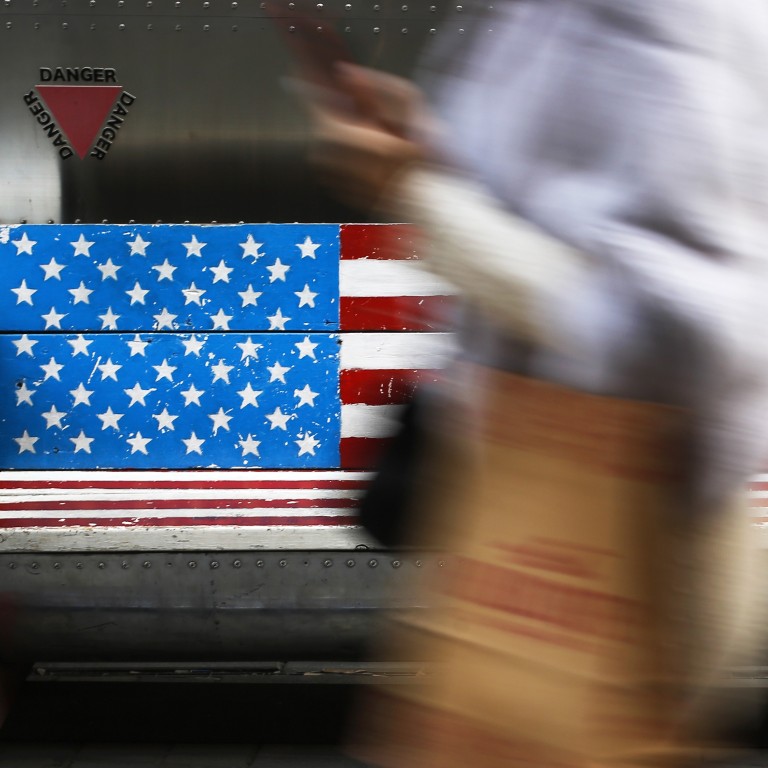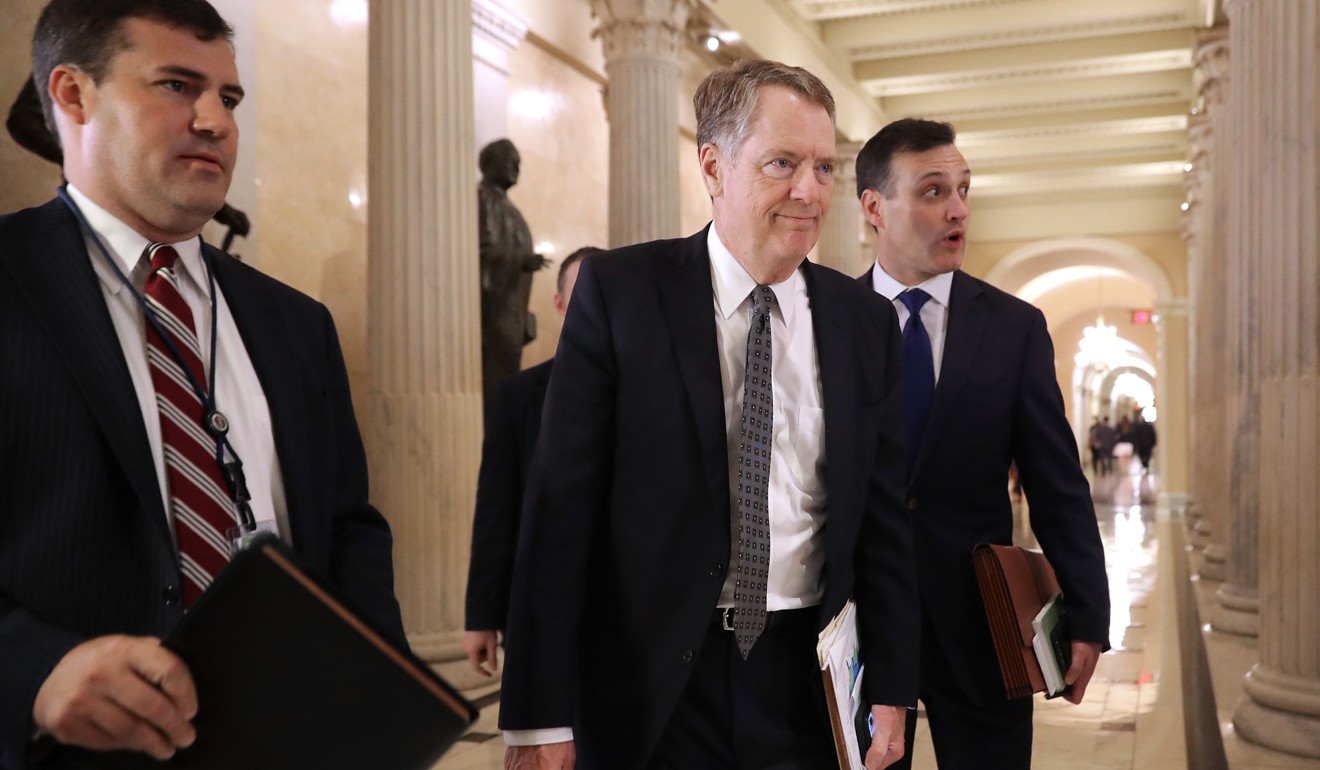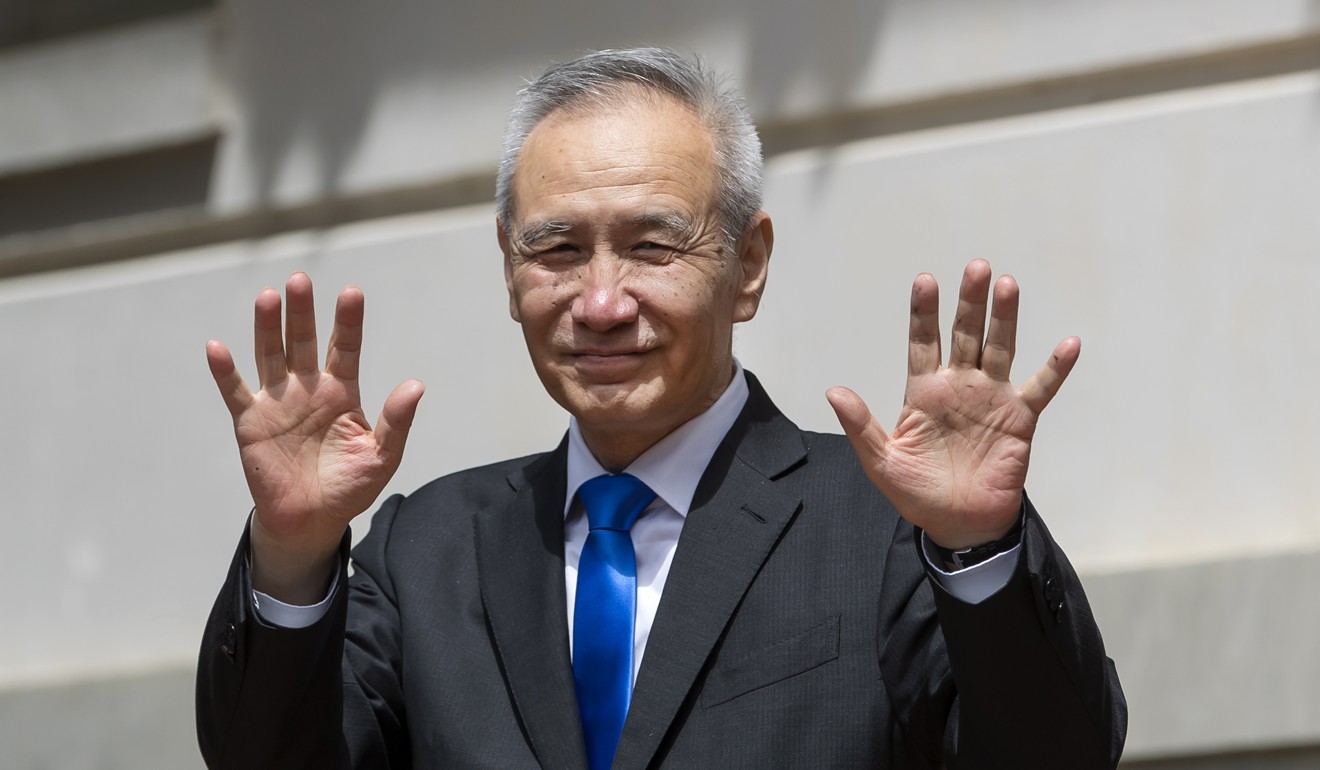
Chinese official picks up ‘clash of civilisations’ theme in lecture to visiting US scholars
- Analysts from a Washington think tank say their recent reception in Beijing had a marked chill, reflecting the countries’ deteriorating relationship
- ‘Some of it was a bit extreme,’ the group’s president said of comments by their host, a Politburo member
An unofficial measure of the increasingly strained US-China relationship as the two giants battle it out over everything from trade and technology to visas and national security is atmospherics. And not surprisingly, on this decidedly unscientific “index”, things appear to be deteriorating quickly.
Scholars with the Peterson Institute for International Economics think tank in Washington, just back from China, said on Tuesday that their official reception at China’s Zhongnanhai leadership compound was markedly less hospitable than in years past.
“We got a 50-minute non-stop lecture, pausing only for translation, about this being a clash of civilisations,” said Adam Posen, the group’s president, who declined to say which member of the Politburo they met with. “And some of it was a bit extreme.”
Peterson Institute scholars said this lecture by their Chinese host focused on how the US was a “Mediterranean culture” based around belligerence and internal division, which explains why it has such an oppressive foreign policy. “Taking it at face value that someone wanted to spend an hour with us, and wanted to deliver a message, it was very interesting that that was the message,” he added.
The references follow competing visions of civilisation by US and Chinese officials in recent weeks. The US State Department’s policy planning director, Kiron Skinner, said on April 29 that rivalry with Beijing was “a fight with a really different civilisation and a different ideology”, and “the first time that we will have a great power competitor that is not Caucasian”. Her comments were sharply criticised by Chinese officials and China’s online community, as well as many in the US.
Were US official’s ‘clash of civilisations’ remarks a slip or something else?
China countered with a conference several weeks later, attended by President Xi Jinping, promoting what it says is its more inclusive vision of civilisation that promotes “harmonious dialogue and coexistence”.
Posen acknowledged that attributing too much significance to one meeting has its limits. The Politburo official might have been in a bad mood or just read an account of US Secretary of State Mike Pompeo “yammering” to his aides about US-China relations, he said. “But it was a very, very striking shift to anything we’ve heard in past years,” he added.
Scholars with the global economics institute said their assessment of bilateral trade prospects coincided with the deteriorating relationship, and that there seemed to be limited chances for a deal to be reached when US President Donald Trump meets Xi at a G20 meeting in Japan in late June, or any time soon.
Among the increasingly intractable factors working against an agreement, they said, was a growing understanding that hundreds of billions of dollars worth of so-called temporary tariffs slapped on each other’s trade are increasingly “sticky” and difficult to remove.
Also working against any near-term resolution is the looming US presidential campaign, the growing list of non-trade irritants on both sides, the anger that Washington’s restrictions on Huawei Technologies have engendered in China and growing US tech investment restrictions justified on national security grounds.
“There is a perception that there is a not-for-sale sign on US technology companies,” said Martin Chorzempa, a financial innovation fellow at Peterson.

The Peterson Institute’s observations regarding an official chilling dovetail with anecdotal comments by US educators and officials who have visited China recently, and with mounting concern among Chinese officials, students and tourists visiting the US who are fearful they might get swept up in the growing bilateral tension.
Scott Kennedy, a director of the Centre for Strategic and International Studies, attended a conference in China this month involving the China Tsinghua Centre that was attended by former ambassador to Britain Fu Ying. Kennedy said he found Chinese attendees concerned but engaged.
“People weren’t throwing up their arms and giving up despondent, or running to their corner to do their ideological talking points,” he said. “There was a recognition of the complexity of this situation.”
Some China experts said Beijing’s decision to apparently send a message through this particular think tank made sense given that Peterson tended to take a more economic, reasoned stance relative to hardline counterparts such as the Heritage Foundation.
Trump planning more restrictions on US tech exports to China
“One problem China has had is finding people who can talk to Trump and who Trump will listen to,” said Stanley Rosen, a political-science professor at the University of Southern California, often relying on such lao pengyou, or old friends, as former secretary of state Henry Kissinger, with little traction in the Trump administration.
Beijing’s focus on “civilisation” was aimed both at China’s domestic constituency and Washington, he added. “They want to send a message that this is a long-term problem, that it’s all the US’ fault and that China is a long civilisation that can outlast these threats,” Rosen said.
But taking on civilisation could be a double-edged sword, others said. Were South Korea and Japan, which modelled their economies on Western systems, considered Western or Asian, asked Dali Yang, a leading expert on Chinese politics at the University of Chicago.
“Marx and Lenin provide the guiding principles for the Chinese Communist Party, are those not Western? Karl Marx wrote his works in the British Museum,” Yang said. “It’s a slippery slope.”

Although Peterson analysts declined to say which Politburo member its officials met with, some on Tuesday’s panel said that senior Chinese negotiator Liu He was in the US meeting with US Trade Representative Robert Lighthizer during their time in China, presumably ruling him out. The University of Chicago’s Yang said a top candidate would be Yang Jiechi, China’s leading diplomat and a Politburo member.
Peterson panellists cited some positive notes from their trip. These included several meetings on proposed changes to the World Trade Organisation – one organised by a research body of the State Council, another organised by Zhu Min, a Chinese economist and deputy managing director of the International Monetary Fund – suggesting real thought being given in Beijing to upgrading the Geneva-based global trade group.
“It was one of the upside surprises of this trip,” said Jeffrey Schott, a trade expert at Peterson, referring to the interest in reform.
One problem China has had is finding people who can talk to Trump and who Trump will listen to
Another positive and counter-intuitive impression from China’s vibrant fintech sector was greater concern over privacy, surveillance and related issues among Chinese citizens than is often appreciated overseas.
“They’re quite advanced about their thinking on this,” Chorzempa said. “Whether this resonates at a higher political level, there’s no indication of that yet.”
Members of the institute fanning out to meet different economic scholars, officials and former officials said the chill was broadly evident. “A lot of our interlocutors were not as forthcoming or candid as they had been than previous trips,” said Nick Lardy, a Peterson expert on the Chinese economy.
Peterson scholars said their reception, combined with the recent decision to broadcast anti-American films on CCTV and political commentary, suggested that Beijing had concluded that dealing with the US would be significantly more difficult than expected.
China growth likely to worsen if US tariffs all remaining China exports, Fitch says
Others said their recent meetings with Chinese academics and government officials were less pointed, indicating that Beijing is moving gingerly, carefully monitoring who is visiting but stopping short of blocking US visas or overtly restricting access in a bid to maintain people-to-people contact.
But Chinese hosts have communicated clearly their displeasure over US brinkmanship, perceived overreach and Washington’s apparent lack of understanding of the need to help Chinese leaders maintain face in the stand-off, said one Western expert who asked not to be identified given current tensions.
“The lack of sensitivity for China’s domestic situation is going to generate massive pushback by the Chinese leadership,” the expert said.

